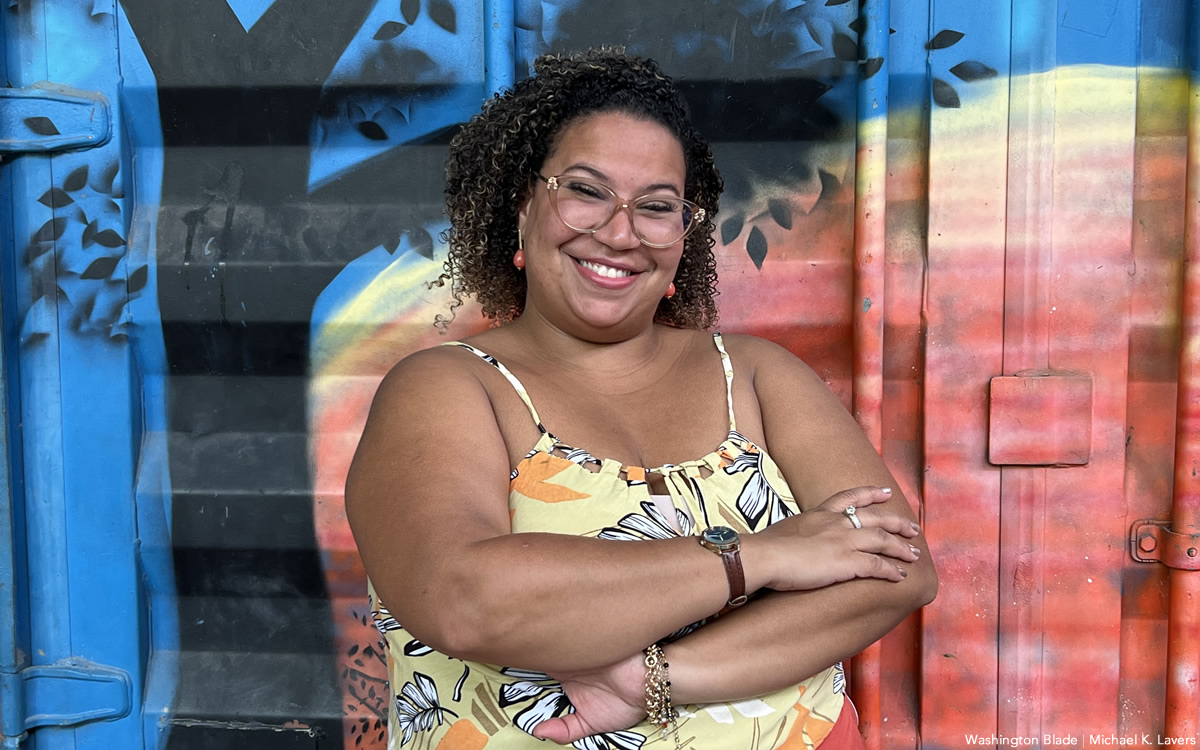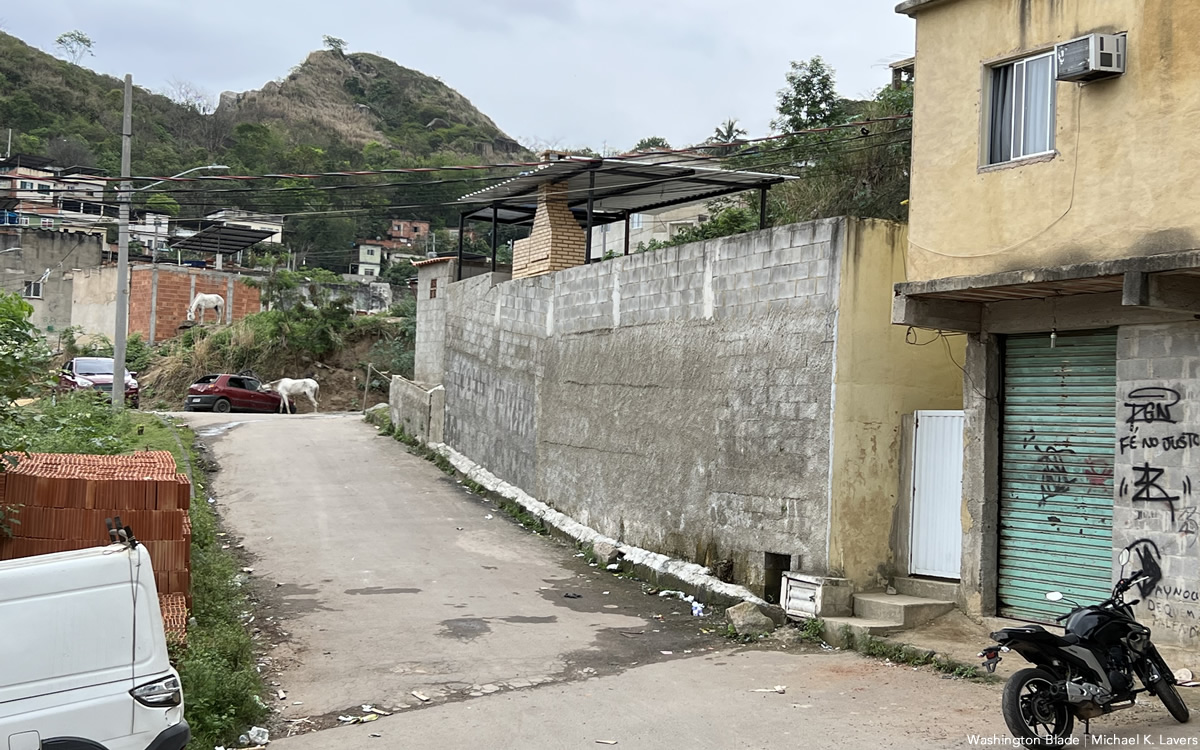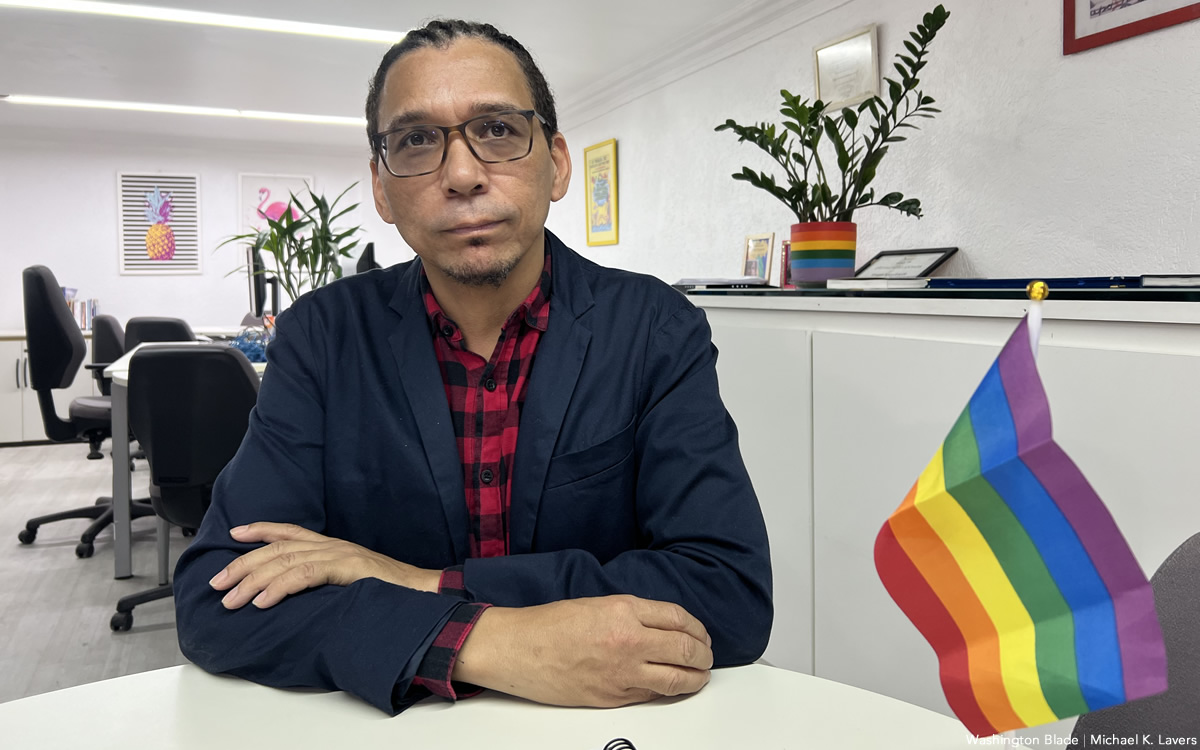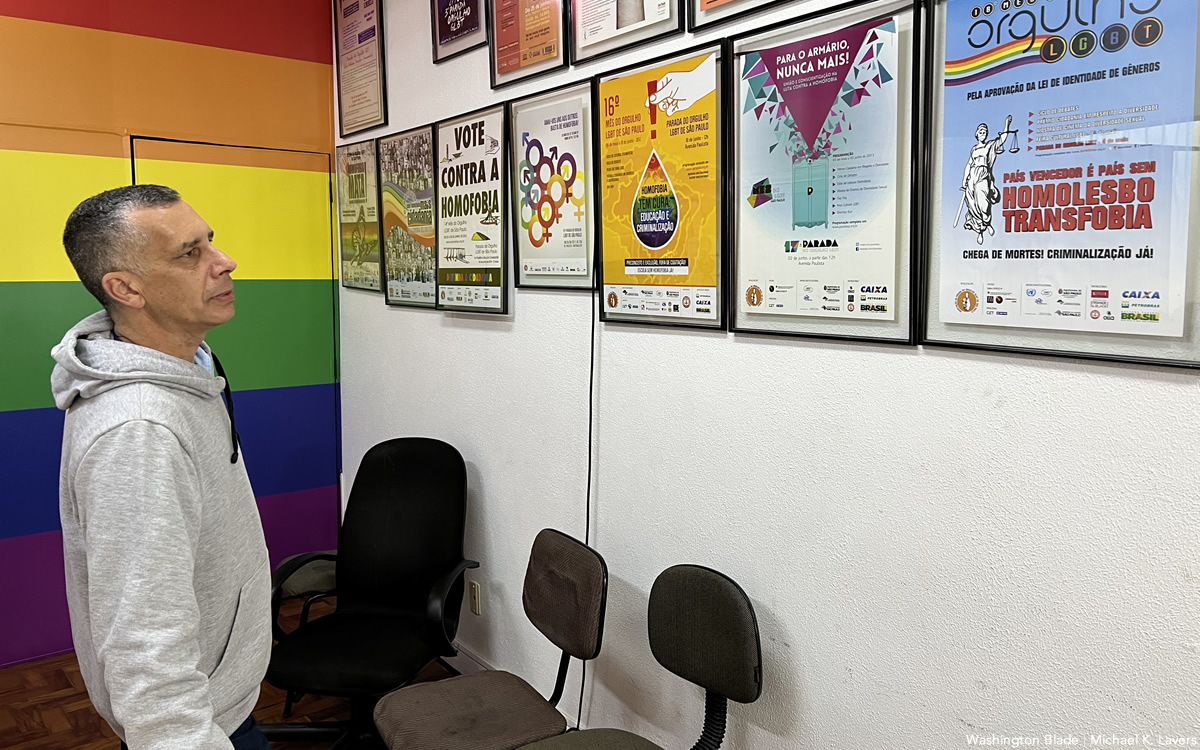Editor’s note: International News Editor Michael K. Lavers was on assignment in Brazil from Sept. 30-Oct. 11.
RIO DE JANEIRO — Michelle Seixas, the national political coordinator of Articulação Brasileira de Lésbicas (Brazilian Articulation of Lesbians), a group that advocates on behalf of lesbians in Brazil, was born in Complexo do Alemão, a complex of favelas in the northern part of Rio de Janeiro.
She spoke with the Washington Blade about her life, her work and Brazil’s presidential election on Oct. 10 during an interview at Espaço Democrático de União, Convivência, Apprendizagem e Prevenção (Democratic Space of Union, Coexistence, Learning and Prevention,) a community center in Complexo do Alemão known by the acronym EDUCAP that Prince Harry officially opened in 2012.
Local drug dealers built the soccer field that is next to EDUCAP. The Blade also saw public housing along one of Complexo do Alemão’s main streets that former President Luiz Inácio Lula da Silva’s government built through its Programa Minha Casa, Minha Vida (My House, My Life Program.)
“(President Jair) Bolsonaro to lesbian women in Brazil is the worst president in Brazil’s history,” Seixas told the Blade.

Mariah Rafaela Silva, a Transgender woman of indigenous descent who works with the Washington-based International Institute on Race, Equality and Human Rights, translated for Sexias.
She, like Seixas, lives in Complexo do Alemão.
“We not only went backwards in social public policy, but we also went backwards in basic human rights,” said Seixas, referring to Bolsonaro.
“We know that there are many people who support Lula,” added Seixas.

Seixas spoke with the Blade eight days after the presidential election’s first round, which took place on Oct. 2.
Da Silva defeated Bolsonaro by a 48.4-43.2 percent margin. They will face off in the presidential election’s second round on Oct. 30 because neither received a majority of votes.
Four of Bolsonaro’s previous Cabinet members — former Justice and Public Security Minister Sergio Moro, former Family and Human Rights Minister Damares Alves, former Agriculture Minister Tereza Cristina and former Science and Technology Minister Marcos Prutes — on Oct. 2 won seats in the Brazilian Congress. São Paulo Municipal Councilwoman Erika Hilton and Belo Horizonte Municipal Councilwoman Duda Salabert on the same day became the first openly transgender congresswomen.
Bolsonaro, a member of the right-wing Liberal Party, represented Rio de Janeiro in the Brazilian Congress from 1991 until he took office in 2018.
The former Brazilian Army captain has faced sharp criticism because of his rhetoric against LGBTQ+ and intersex Brazilians, women, people of African and indigenous descent and other groups.
He has encouraged fathers to beat their sons if they think they are gay.
Bolsonaro during a 2019 press conference in the White House Rose Garden stressed his “respect of traditional family values.” Bolsonaro has expressed his opposition to “gender ideology,” supports legislation that would limit LGBTQ+-specific curricula in Brazil’s schools and condemned a 2019 Brazilian Supreme Court ruling that criminalized homophobia and transphobia.
A Brazilian Federal Police investigator in August called for prosecutors to charge Bolsonaro with incitement for spreading false information about COVID-19 after he said people who are vaccinated against the virus are at increased risk for AIDS. Bolsonaro’s efforts to discredit the country’s electoral system have increased concerns that violence could erupt if he does not accept the election results if he loses to Da Silva, a member of the leftist Workers’ Party who was Brazil’s president from 2003-2010.

Moro, who was a judge before he joined Bolsonaro’s government, in 2017 sentenced Da Silva to 9 1/2 years in prison after his conviction on money laundering and corruption charges that stemmed from Operation Car Wash. The Supreme Court in November 2019 ordered Da Silva’s release.
Julian Rodrigues, who was the coordinator of the Workers’ Party’s National Working Group from 2006-2012, noted to the Blade during a previous interview that Da Silva in 2004 created the Health Ministry’s “Brazil without Homophobia” campaign. Rodrigues also highlighted Da Silva created the Culture Ministry’s Diversity Secretariat that, among other things, funded community centers and sought to make police officers and other law enforcement officials more friendly to LGBTQ+ and intersex people.
Da Silva during the campaign has publicly highlighted his support of LGBTQ+ and intersex rights.
“We know that the fight against prejudice and homophobia is a daily fight,” said Da Silva in a campaign video that Associaçao Nacional de Travestis e Transexuais (National Association of Travestis and Transsexuals), a Brazilian Trans rights group known by the acronym ANTRA, shared on its Instagram page. “I have a lot of respect for all the gay, lesbian, bisexual, travestis and Trans people who live in Brazil.”
Hilton is among Da Silva’s more outspoken supporters. Lou Lou, a bar in Rio de Janeiro’s Ipanema neighborhood, and other establishments in the country that are popular among LGBTQ+ and intersex Brazilians also indicate their support for Da Silva with prominently placed stickers.

Cláudio Nascimento, president of Grupo Arco-Íris de Cidadania LGBT (Rainbow LGBT Citizen Group), an LGBTQ+ and intersex rights group in Rio de Janeiro, on Oct. 9 handed the Blade a sticker that read, “no LGBT votes for Bolsonaro” (“Nenhum voto LGBT em Bolsonaro”) before he sat down for an interview at his office.
Nascimento said Bolsonaro’s government and the federal government “hasn’t done anything for the community.” Nascimento also stressed Bolsonaro’s comments against LGBTQ+ and intersex Brazilians and other minority groups.
“He has also made speeches,” Nascimento told the Blade. “He speaks against the LGBT community. It stimulates hatred, stimulates persecution and stimulates violence, discrimination.”
Nascimento said he supports Da Silva because he does not represent a threat to democracy.
“Our concern is that if Bolsonaro is elected, he will destroy democracy from within democracy,” said Nascimento.

Patricia Mannaro, a lawyer who co-founded Aliança Nacional LGBTI (National LGBTI Alliance), a national LGBTQ+ and intersex rights group, echoed Nascimento when she spoke with the Blade at a São Paulo coffee shop on Oct. 5.
Mannaro said human rights in Brazil will “continue dying” if Bolsonaro wins re-election.
Voters in Lins, a municipality in São Paulo state, in 2012 elected Edgar Souza as their mayor.
Souza, who is Brazil’s first openly gay mayor, agreed with Mannaro when he spoke with the Blade on Oct. 6 at his São Paulo office.
“I am not voting for Lula because I’m in love with Lula,” said Souza. “I have a lot of criticism of Lula and the PT (Workers’ Party,) but Lula does not threaten democracy. He respects democratic rule and I respect institutions. He respects the separation of powers.”
“Bolsonaro would threaten all of that,” added Souza.

Renato Viterbo, vice president of Parada LGBT+ de São Paulo (São Paulo LGBT+ Parade) on Oct. 5 noted to the Blade during an interview at his office that marriage equality and most other LGBTQ and intersex rights advances in Brazil have happened because of court rulings, as opposed to legislation.
Viterbo said these advances could come under threat if Bolsonaro wins a second term, in part, because his party on Oct. 2 gained seats in Congress. Viterbo also stressed Bolsonaro continues to garner support in Brazil because he reflects attitudes that persist in the country.
“We are a sexist, anti-Semitic, racist and xenophobic country,” said Viterbo. “Democracy will be threatened if this government is reelected.”








